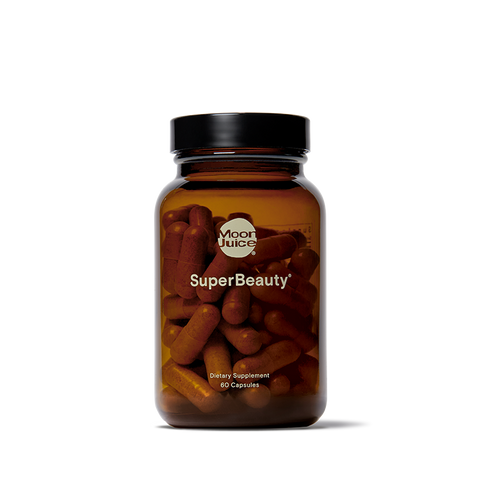Seeking relief from non-cystic acne? There are countless causes of acne, with even more treatments that purportedly reduce breakouts. If you’ve yet to reach clear skin with typical topicals and supplements, there’s an unsung hero of skincare that you might not have tried yet: Glutathione.
Keep reading to learn more about the powerful ingredient and how to use Glutathione for acne in your skin care routine.
What Is Glutathione?
Glutathione is the master antioxidant naturally found in every cell of the body. Its primary role is to maintain cellular function and structure. It fulfills this role by protecting mitochondria — organelles that produce a large portion of chemical energy required to power the cells’ biochemical reactions — from oxidative damage (aka oxidative stress).
When mitochondrial DNA volume and integrity are compromised, free radicals proliferate, and cell damage occurs, leading to accelerated aging and wrinkles.
The more Glutathione you have, the better you’ll be able to stave off oxidative stress to look and feel healthy.
Although the body naturally produces Glutathione, it becomes less abundant due to aging, stress, and exposure to toxins. To reap Glutathione’s benefits for your skin and greater health, you’ll want to find ways to use it inside and out.
What Causes Acne?
Acne has many causes, including:
- Build-up of bacteria
- Overproduction of sebum, which clogs pores
- Hormonal imbalances
- Gut imbalances
- Genetics
- Smoking
- Stress
- Dietary triggers like dairy, sugar, and highly processed foods
- Comedogenic skin care products
- Skin barrier damage
Also associated with the development of acne is oxidative stress, which doesn’t occur only after breakouts rear their head. Per a 2012 review in the Journal of Drugs in Dermatology, oxidative stress may be a factor that triggers the development of acne in its early stages. More recently, a 2019 review in the Galen Medical Journal confirms that oxidative stress plays a pivotal role in the pathogenesis of acne.
Since Glutathione is a powerful antioxidant, it makes sense that it’s used as an acne treatment to promote a clearer complexion by warding off the detrimental effects of oxidative damage.
How Glutathione Can Help With Non-Cystic Acne
Research shows a clear association between low Glutathione status and breakouts:
- One 2013 study in the Journal of Clinical Laboratory Analysis shows that acne patients have lower Glutathione serum levels.
- A 2011 study published in the Journal of Cosmetic Dermatology similarly demonstrates that a decrease in Glutathione may spur the development of acne.
- More specifically, a 2001 study in the Journal of Dermatology shows that participants with papulopustular acne — i.e., inflammatory papules (slightly raised nodules) and pustules (pimples with white or yellow pus) — had significantly decreased activities of Glutathione peroxidase.
It’s clear that the more Glutathione you have, the merrier — and that’s not only where acne is concerned. In addition to using Glutathione for acne, increasing Glutathione levels may help:
- Brighten complexion
- Reduce the appearance of lines and texture
- Support skin elasticity
- Visibly brighten dark spots
How to Use Glutathione for Non-Cystic Acne
Apply Skin Care with Glutathione
When applied topically, a Glutathione treatment acts as a shield against environmental toxins like pollution and UV rays. G Pack™ is a Vitamin C powder for your face with an innovative antioxidant formula that combines 10% Glutathione, 50% Vitamin C, and 3% Ferulic Acid. Add 1 to 3 scoops to your favorite water-based hyaluronic acid serum (such as Plump Jelly) twice daily to help fortify against oxidative stress. Remember:
Less oxidative stress means a lower likelihood of developing non-cystic acne — not to mention a more youthful and supple complexion overall.
When you use G Pack™ with Plump Jelly, you get to experience the powerful benefits of vitamin C serum.
Try a Glutathione Supplement
To boost your Glutathione level and promote healthy skin clarity from within, find supplements that offer it. SuperBeauty® is the master antioxidant formula to help protect from accelerated aging, promote collagen and elasticity, and minimize the appearance of fine lines. These skin care capsules pack 250 mg of the master antioxidant in each dose. Clinical research shows that this amount yields a multitude of benefits for your skin without adverse side effects.
The vegan cellular skin care supplement also offers 45 mg of Vitamin C and 15 mg of Vitamin E. These famous antioxidants complement Glutathione by helping to neutralize free radicals. In addition, SuperBeauty® includes:
- 4 milligrams of Astaxanthin to support skin elasticity and minimize the appearance of fine lines
- 50 milligrams of Schisandra, an adaptogen traditionally used to promote skin clarity and hydration
- 10 milligrams of Silica, a cofactor of collagen and elastin production
It’s important to take any supplement as directed and on a consistent basis to maximize results. Commit to taking 2 caps of SuperBeauty® every morning, with or without food. By sticking to this Glutathione supplementation routine, you should start to notice visible improvements in your skin in as little as 4 weeks.

Sources
- https://www.genome.gov/genetics-glossary/Mitochondria
- https://www.ncbi.nlm.nih.gov/pmc/articles/PMC4003832/
- https://pubmed.ncbi.nlm.nih.gov/22648222/
- https://www.ncbi.nlm.nih.gov/pmc/articles/PMC8344136/
- https://pubmed.ncbi.nlm.nih.gov/23325743/
- https://pubmed.ncbi.nlm.nih.gov/21896138/
- https://pubmed.ncbi.nlm.nih.gov/11349462/

-(1).png?v=1681384956762)
.png?v=1681384970043)










